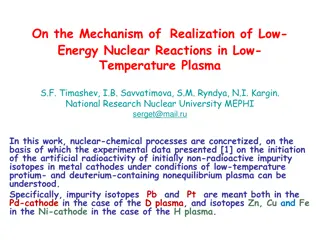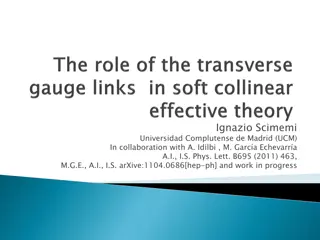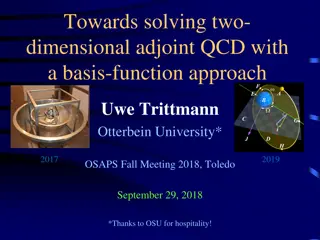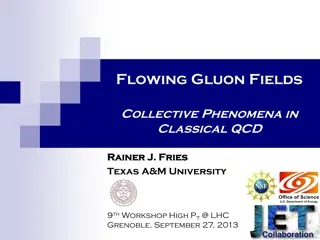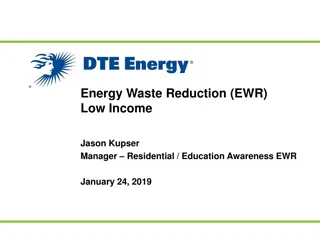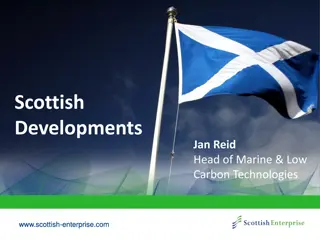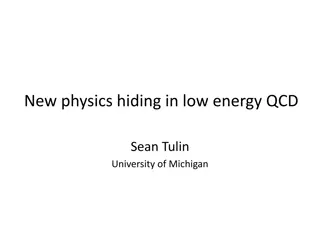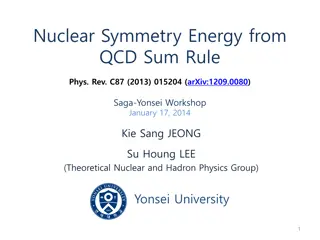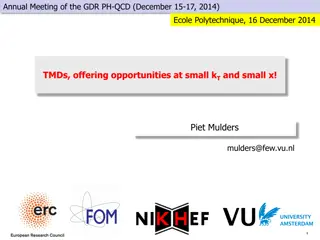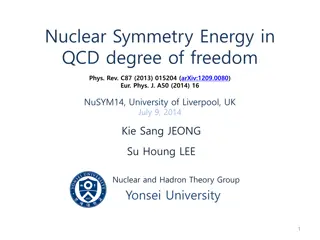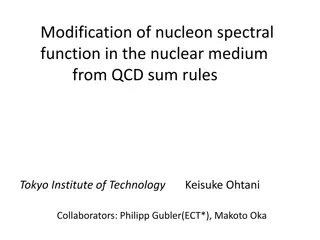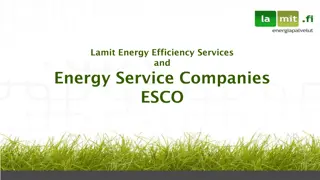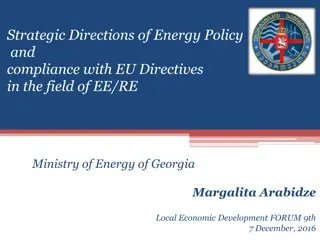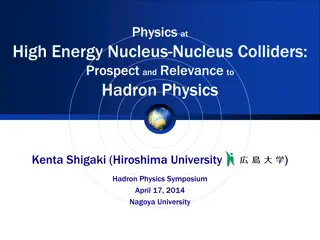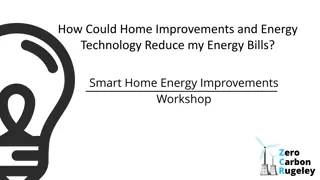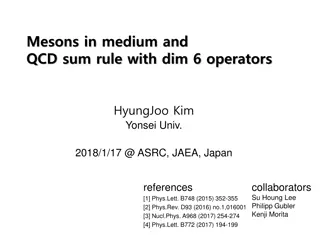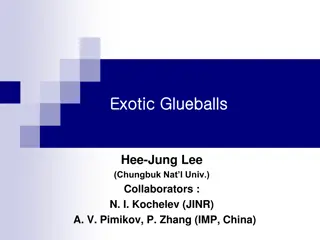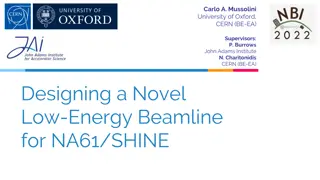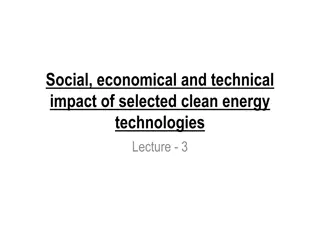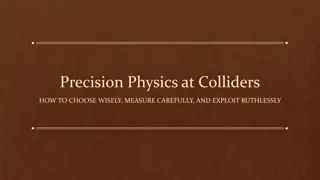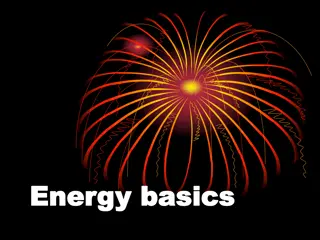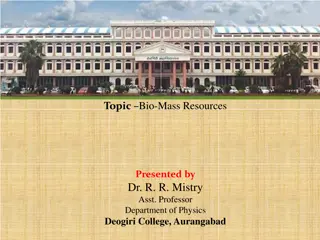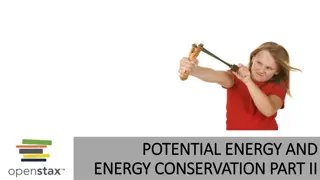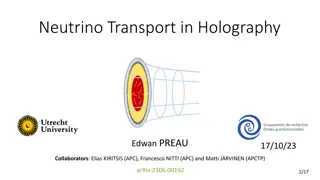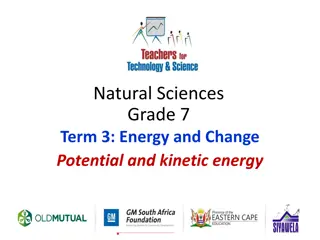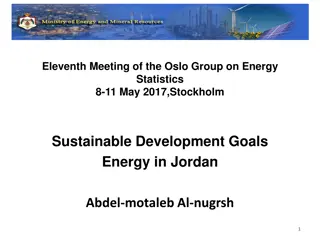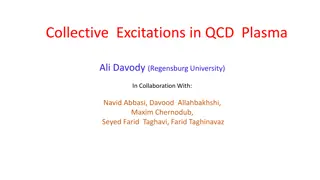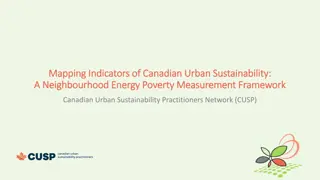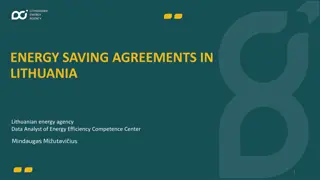Green Energy Market
Green energy also referred to as clean energy, is usually derived from natural sources that are constantly replenished. Solar energy, wind energy, hydroelectric power, biomass energy, geothermal energy, tidal energy, and wave energy are different types of renewable energy. Solar energy is the radian
6 views • 6 slides
Comprehensive Overview of Energy Balances in Germany
This material covers various aspects of energy balances in Germany, including components of energy flowcharts, renewable energy sources in the German energy balance, and total final consumption of road transport energy. It provides a detailed analysis of energy imports, domestic extraction, losses,
2 views • 10 slides
Understanding Energy: Types, Potential, and Kinetic
Dive into the world of energy with a comprehensive guide covering the definition, types, and characteristics of gravitational, potential, and kinetic energy. Explore how energy is the driving force behind all work and movement, with examples and explanations provided for each energy type. Gain insig
2 views • 24 slides
Sustainable Energy Initiatives at Local Level in Lithuania
The National Parliamentary Workshop on Energy Efficiency highlighted the importance of renewable energy development and sustainability at the local level in Lithuania. Initiatives such as the Breakthrough package and Renewable Energy Communities aim to improve energy efficiency, reduce energy povert
2 views • 12 slides
Exploring Energy Stores and Transfers in Science Lessons
Dive into the fascinating world of energy stores and transfers through engaging science lessons. Recall different energy stores, common energy transfers, and create flow diagrams to illustrate energy transfers in various scenarios. Explore gravitational, elastic, magnetic, electrostatic potential en
5 views • 9 slides
Energy Assistance Workshop Series Statewide Assessment
The Energy Assistance Workshop Series conducted a statewide assessment to understand energy burden and discuss utility energy assistance programs. The goal was to evaluate the effectiveness of mechanisms for energy assistance to prioritize households with higher energy burdens. The workshops aimed t
0 views • 26 slides
Understanding Energy Transformation in the Natural World
Energy transformation occurs continuously in various forms around us, following the Law of Conservation of Energy. From thermal to chemical and electromagnetic energy, different types of energy are converted and utilized in everyday processes. Examples include the conversion of thermal energy to ele
0 views • 27 slides
Understanding Energy - Forms, Calculations, and Applications
Explore the concept of energy through various images, including forms of energy, kinetic versus potential energy, and calculations involving kinetic and potential energy. Learn about identifying energy states, calculating kinetic energy, and solving physics problems related to energy transfer. Dive
0 views • 27 slides
Understanding Energy Transfers with Sankey Diagrams
Sankey diagrams are visual tools that depict energy transfers within a system, offering insights into efficiency and energy distribution. By examining the width of arrows representing energy flow, one can analyze useful and wasted energy outputs. Inefficient systems show a disproportionate amount of
1 views • 9 slides
Mechanism of Low-Energy Nuclear Reactions in Low-Temperature Plasma
This work discusses nuclear-chemical processes underlying low-energy nuclear reactions in low-temperature plasma environments, focusing on the initiation of artificial radioactivity in metal cathodes under protium- and deuterium-containing nonequilibrium plasma conditions. The role of electrons with
4 views • 6 slides
Understanding SCET: Effective Theory of QCD
SCET, a soft collinear effective theory, describes interactions between low energy, soft partonic fields, and collinear fields in QCD. It helps prove factorization theorems and identifies relevant scales. The SCET Lagrangian is formed by gauge invariant building blocks, enabling gauge transformation
0 views • 38 slides
Algebraic Solutions for Two-Dimensional Adjoint QCD
Two-dimensional adjoint QCD is explored with a basis-function approach aiming to achieve single-particle states over cluttered multi-particle states. The algebraic solution involves t'Hooft-like integral equations and pseudo-cyclicity considerations to address parton number violation and boundary co
0 views • 22 slides
Understanding Flowing Gluon Fields and Color Glass Phenomena in QCD
Explore the collective phenomena of gluon fields in classical QCD, focusing on the Standard Model of URHICs, Color Glass, and Gluon Fields in the Forward Lightcone. The research delves into topics like local thermal equilibrium, viscous hydrodynamics, and the interaction of probes with quarks and gl
0 views • 24 slides
Energy Waste Reduction (EWR) Low Income Program Overview
The Energy Waste Reduction (EWR) Low Income program by DTE Energy aims to reduce energy use for low-income households through various cost-effective measures. The program includes assistance for single-family homes and multifamily buildings, home energy consultations, and behavioral reports. Despite
1 views • 15 slides
Conducting an Effective School Energy Audit
Performing an energy audit at a school helps in understanding energy usage patterns, identifying areas of waste, and creating energy-saving action plans. The audit involves collecting data, creating switch-off lists, and filling out templates methodically to track energy consumption. It should be do
0 views • 16 slides
Scottish Energy Developments and Innovation in Marine and Low Carbon Technologies
Scotland's energy sector is pioneering climate-friendly initiatives towards decarbonization by 2030. The focus lies on supporting renewable energy sources, enhancing energy system flexibility, efficiency, and resilience, and promoting the marine sector's advancements in tidal energy projects. The co
0 views • 11 slides
Exploring CP Violation in Low-Energy QCD: New Physics Perspectives
Investigating CP violation in low-energy QCD, this presentation by Sean Tulin from the University of Michigan delves into the sensitivities of decays to new physics, focusing on CP violation beyond the Standard Model and the potential existence of new weakly-coupled light forces hiding under QCD. Di
0 views • 37 slides
Exploring Nuclear Symmetry Energy with QCD Sum Rule
This study delves into the concept of nuclear symmetry energy through the lens of QCD Sum Rule, discussing its implications in Rare Isotope Accelerator Plan and nucleon-nucleus scattering. Utilizing mean field approximation and Borel transformation, the research aims to understand asymmetric nuclear
0 views • 21 slides
Exploring Transverse Momentum Distributions (TMDs) at the GDR PH-QCD Annual Meeting
The Annual Meeting of the GDR PH-QCD focused on discussing Transverse Momentum Distributions (TMDs) and their significance at small kT and small x values. Topics covered include gauge-invariant correlators, PDFs, and PFFs, as well as the utilization of color gauge links in describing partonic transv
0 views • 33 slides
Nuclear Symmetry Energy in QCD Degree of Freedom
Understanding the nuclear symmetry energy in the context of Quantum Chromodynamics (QCD) is essential for nuclear phenomenology. This study explores topics such as QCD sum rules, mean field approximation, and operator product expansion to decipher the energy properties of nuclear systems. The resear
0 views • 15 slides
Modification of Nucleon Spectral Function in Nuclear Medium from QCD Sum Rules
Investigating the modification of nucleon properties in the nuclear medium using QCD sum rules, focusing on hadron properties, mass spectrum, and chiral symmetry restoration. The study discusses the mass differences, non-perturbative contributions, and the analysis of QCD sum rule in nuclear matter.
0 views • 27 slides
Understanding Different Forms of Energy and Work in Physics
Energy in physics is the capacity to do work, and there are various forms of energy such as radiant energy, kinetic energy, gravitational potential energy, elastic potential energy, chemical potential energy, nuclear potential energy, electrical potential energy, thermal energy, and sound energy. Ea
0 views • 47 slides
Understanding Energy Service Companies (ESCOs) and Their Role in Energy Efficiency
Energy Service Companies (ESCOs) like Lamit offer a range of energy services, from implementing energy-efficiency projects to renewable energy solutions. These companies work as long-term energy management partners, focusing on understanding customer needs, providing energy-saving solutions, and gua
2 views • 18 slides
Overview of Energy Policy and Compliance with EU Directives in Georgia
Ministry of Energy in Georgia focuses on strategic directions for energy policy in alignment with EU directives. The Energy Strategy, Covenant of Mayors, and National Energy Efficiency Action Plan are key initiatives promoting energy efficiency and renewable energy. Projects include consultancy on s
0 views • 10 slides
Exploring Quark-Gluon Plasma and New State of Matter at High Energy Colliders
Delve into the realm of high-energy physics at nucleus-nucleus colliders, with a focus on the discovery of deconfined partonic matter and the investigation of parallel worlds. Explore the recent insights, emerging topics, and new phenomena observed in ultra-intense collisions. Uncover the properties
0 views • 35 slides
Exploring Home Energy Improvements and Smart Technology for Energy Efficiency
Discover how home improvements and energy technology can significantly reduce energy bills. Join the Smart Home Energy Improvements Workshop in Zero Carbon Rugeley to explore approaches for sustainable energy production and usage at home. Learn about retrofitting, smart energy systems, and meet char
0 views • 20 slides
Mesons in Medium and QCD Sum Rule with Dim-6 Operators
Study of mesons in medium and their behavior using QCD sum rule with dim-6 operators, exploring mass shifts, broadening, and indicators of quark-gluon plasma. Specifically focuses on charmonium sequential dissociation and non-perturbative methods in QCD such as lattice QCD and Dyson-Schwinger equati
0 views • 27 slides
Exploring Exotic Glueballs and Hadrons in QCD Sum Rule
Delve into the world of exotic glueballs and hadrons through a review of QCD sum rule, investigation of light scalar mesons, and discussion on hadrons with unconventional quantum numbers. Learn about theoretical frameworks and calculations involving correlators, dispersion relations, Borel transform
0 views • 32 slides
Designing a Novel Low-Energy Beamline for NA61/SHINE at CERN
Carlo A. Mussolini from the University of Oxford, working at CERN, is designing a new low-energy beamline for NA61/SHINE experiment. The need for a low-energy beamline arises from the lack of particle production data in the 1-13 GeV/c momentum range. Current beam facilities at CERN face challenges w
0 views • 24 slides
Social, Economical, and Technical Impact of Clean Energy Technologies
This course covers the management of micro-level clean energy projects, emphasizing the social, economic, and technical impacts of selected clean energy technologies. It discusses project organization, tools, project life cycle, financial analysis, barriers, capacity building, and more. It delves in
0 views • 32 slides
Precision Physics at Colliders: Choosing Wisely, Measuring Carefully, and Exploiting Ruthlessly
Precision Physics at Colliders explores the selection, measurement, and utilization of data at colliders, focusing on fundamental symmetries and parameters of the Standard Model. The lectures cover topics such as QCD, top, electroweak, and flavor physics, emphasizing the importance of precision meas
0 views • 42 slides
Understanding Energy Basics: Temperature, Heat, and Transfer
Explore the fundamental concepts of energy, including temperature, heat, and energy transfer. Learn how temperature differs from heat, how they are measured, and the relationship between thermal energy and water volume. Discover the role of chemical energy and sound energy, and how energy is transfo
0 views • 12 slides
Biomass Resources: A Sustainable Energy Source Explored by Dr. R. R. Mistry
Biomass, as presented by Dr. R. R. Mistry, consists of various resources such as trees, cultivated plants, algae, urban waste, and rural waste, which play a crucial role in generating energy through photosynthesis. The conversion of solar energy into biomass energy is primarily achieved through this
0 views • 20 slides
Understanding Elastic Potential Energy and Energy Conservation Principles
Elastic potential energy is stored in elastic bodies like springs and is vital in understanding energy conservation principles. This energy can be calculated using the work done by an ideal spring on a block. By applying elastic potential energy concepts, one can analyze scenarios where a spring sys
0 views • 9 slides
Neutrino Transport in Holography Research Study
This research study delves into the realm of neutrino transport in holography, focusing on the interaction of neutrinos with dense QCD matter in the core. Motivations, formalisms, holographic set-up, and the holographic correspondence are explored using a toy model of quark matter in 4SYM and utiliz
0 views • 32 slides
Understanding Energy: Potential and Kinetic Forms in Grade 7 Natural Sciences
Energy in various forms is explored in Grade 7 Natural Sciences, with a focus on potential and kinetic energy. Energy is the ability to do work and exists in different types like heat, chemical, electromagnetic, nuclear, and mechanical. The sun serves as a primary energy source. Potential energy is
0 views • 11 slides
Energy Strategy and Challenges in Jordan: Towards Sustainable Development
The Eleventh Meeting of the Oslo Group on Energy Statistics discussed the energy sector in Jordan, highlighting challenges such as population growth, energy demand, and high energy costs. Jordan aims to diversify energy resources, reduce oil dependency, and enhance environmental protection through i
0 views • 34 slides
Collective Excitations in QCD Plasma: Hydrodynamic Regime Overview
This research presentation by Ali Davody and collaborators from Regensburg University explores collective excitations in QCD plasma, focusing on chiral hydrodynamics, magnetic and vortical waves, hydrodynamic excitation descriptions, and modes derived from kinetic theory. The study delves into the d
0 views • 33 slides
Mapping Indicators of Canadian Urban Sustainability: A Framework for Neighborhood Energy Poverty Measurement
The Canadian Urban Sustainability Practitioners Network (CUSP) is implementing a project to reduce energy poverty through local clean energy access programs. The project aims to achieve energy and emissions goals, transition to clean energy, and benefit low/moderate-income households. By utilizing a
0 views • 24 slides
Energy Saving Agreements in Lithuania: Legal Framework and Targets
Lithuania's energy saving agreements are guided by a comprehensive legal framework including laws on energy efficiency and methodologies for energy audits. The country has set ambitious energy efficiency targets for 2030, focusing on sectors like building renovation, industry, and household applianc
0 views • 14 slides









